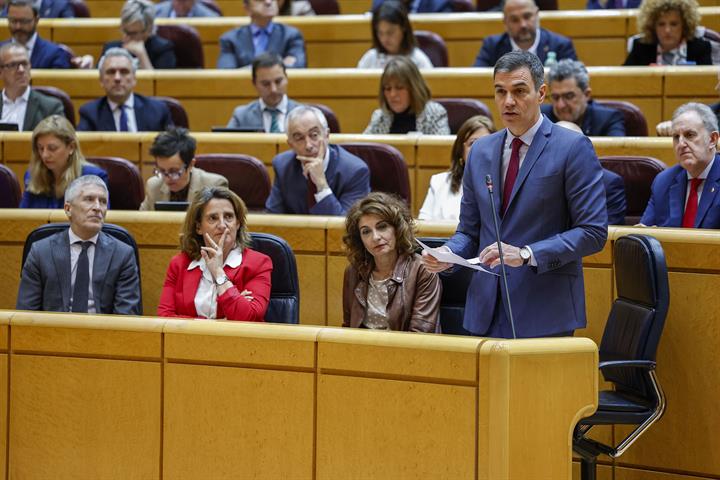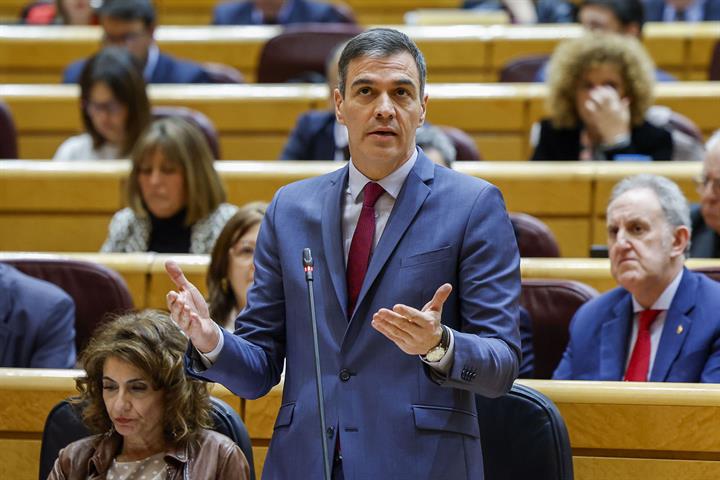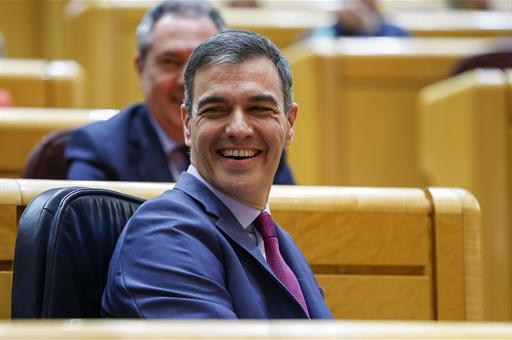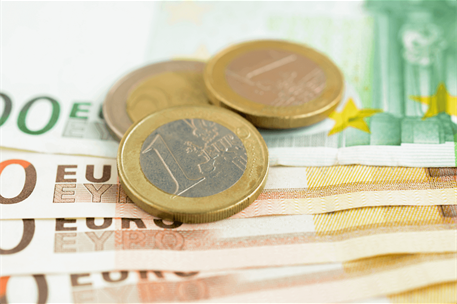Government Control Session
Sánchez states that he is consolidating the project he started six years ago: more jobs, more rights and more coexistence
President's News - 2024.3.12
Upper House of Parliament, Madrid
During his intervention in the Government control session in the Upper House of Parliament, the chief executive defended the political stability offered by his Executive before the PP's Senator Alicia García, who questioned him on this matter.
Pedro Sánchez recalled the difficulties his government has faced, including the health emergency caused by COVID-19, which started four years ago this week. Spain, he said, pulled through and saved many lives, jobs and businesses thanks to the income protection policies approved at the time, already recovering the previous levels of GDP and employment just two years after the pandemic.
The president also highlighted his Government's management in this legislature: "Since the beginning of the legislature and the formation of the new Government 100 days ago, what we are doing is consolidating the political project we set in motion six years ago: more employment, more rights and more coexistence".
Sánchez reviewed his Government's performance, pointing out that article 49 of the Constitution has been reformed, the Minimum Interprofessional Wage has been raised by 54% in the last six years, with the Minimum Basic Income, pensions and the salaries of public employees having likewise been raised. The Government has also subsidised public transport, reduced VAT on foodstuffs and reduced the VAT on electricity and gas bills. Furthermore, the amount earmarked for scholarships for the 2024-2025 academic year has reached an all-time high.
The president stressed that more than two million free season tickets have been issued for local, commuter and medium-distance trains. Also in the current legislature, the Government has asked the European Commission for the fourth disbursement of European funds worth €10 billion.
Pedro Sánchez went on to highlight the fact that several bills have been sent to Parliament, such as the Prevention of Food Loss and Waste Bill, the Families Bill, the Parity Bill, the Trafficking Bill, the Artistic Education Bill, the Sustainable Mobility Bill, and the bill to improve the conditions of forest firefighters.
The chief executive argued that his political action is "real politics, the things that matters to the citizens", pointing out that "this Government manages the economy much better because it puts it at the service of the social majority of the country".
In this respect, Sanchez reported the data on job creation and economic growth: Spain is growing five times faster than the Eurozone, creating four out of every ten new jobs in the EU and breaking records with more than 21 million national insurance contributors, as well as more women working and contributing than ever before.
The president also predicted that this year the public deficit will be reduced to below 3%, indicating that the public debt has been reduced by more than 17 points since the end of the pandemic. He concluded by pointing out that foreign investment in Spain exceeded €34 billion in 2023, the second highest in the last 20 years, which is evidence of the confidence that foreign investors have in the economy and in the stability of the country.
Dialogue and agreement with Catalonia
 Speech by the President of the Government of Spain, Pedro Sánchez, during the Government control session held in the Upper House of Parliament | EFE
Speech by the President of the Government of Spain, Pedro Sánchez, during the Government control session held in the Upper House of Parliament | EFE
In his response to ERC's Senator Sara Bailac, the president stated that the Executive "is complying with Catalonia" through negotiation and agreement, both in the monitoring commissions between the central and regional governments and in the parliamentary sphere.
As proof of this dialogue, the chief executive mentioned that the amnesty law to normalise political life in Catalonia would be passed this week in the General Courts, as would other initiatives aimed at tackling historical "deficits". In this regard, he announced a new meeting of the dialogue table between the Government of Spain and the Generalitat de Catalunya, an organic law guaranteeing multilingualism that safeguards the right of citizens to address the General State Administration in all the co-official languages, the transfer of the management of the Minimum Basic Income and the promotion of funding for the installation in Catalonia of a technology centre for the production of semiconductors and chips.
Pedro Sánchez also highlighted the coordination between the central and regional administrations to tackle the drought and the progress made in the Generalitat-State Bilateral Commission on matters such as scholarships and study grants, the implementation of the new judicial bodies and various hydraulic works.
The chief executive stated that work is also being carried out to fulfil the investiture commitments "with agreements that are very important for society in Catalonia", such as the development of the timetable for the transfer of commuter trains and debt relief, which is going to be extended to the rest of the autonomous communities that relied on the Autonomous Liquidity Fund during the financial crisis. "This is going to mean some €15 billion of Catalonia's debt, with a saving of €1.3 billion in interest. This will give the Government of Catalonia the financial capacity, muscle and autonomy to be able to continue deploying social policies," he said.
Pedro Sánchez also stressed the Government's willingness to establish a new system of regional funding, advocating combining an increase in economic resources with the communities' fiscal co-responsibility.
Boosting Galicia's railway infrastructures
 Speech by the President of the Government of Spain, Pedro Sánchez, during the Government control session held in the Upper House of Parliament | EFE
Speech by the President of the Government of Spain, Pedro Sánchez, during the Government control session held in the Upper House of Parliament | EFE
Regarding the improvement of Galicia's railway infrastructures, an issue raised by the BNG's Senator María Carmen da Silva, the president assured that the Executive is "reversing a historical deficit" with that community and that there are "four more years to continue advancing along the same path".
Pedro Sánchez explained that, since June 2018, the Government has invested €1.14 billion in these infrastructures in Galicia, which has made possible, among other advances, the commissioning of the new Vigo station and the last section of the high-speed line that connects the community with the rest of Spain. Other "milestones" the president mentioned are the launch of recurrent season tickets, which last year saved users €30 million, and the launch yesterday of a campaign to travel by train to Galicia between 1 April and 6 May this year, for just €25.
As for the planned actions, the chief executive has advanced that once Talgo delivers the new 106 series trains, Galicia will have almost twice as many seats as at present, and frequencies and journey times will be improved. In addition, the Government will continue to make progress in the modernisation of the Ourense-Monforte-Lugo line, with an investment of nearly €640 million, and in the León-Ourense-Vigo connection, among other sections.
Meanwhile, the Atlantic corridor is already being tendered, the railway access to the outer harbour of A Coruña is underway with a budget of more than €120 million, and the development of intermodal stations is ongoing. "In this the 21st century, Galicia will have completely renovated stations in its capitals and main cities," said Sánchez.
Non official translation






